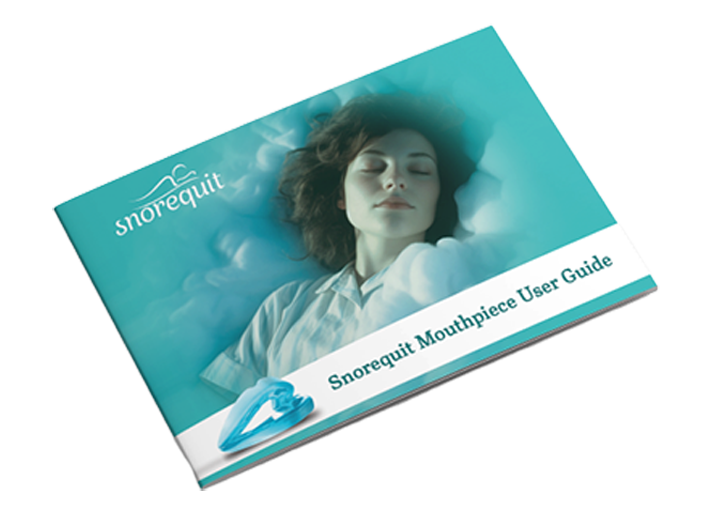What Causes Snoring?
Snoring noise is caused by turbulent air that vibrates the soft tissues in your airway. As you sleep the tissue in the back of your throat and in your nasal passages relax, and your tongue collapses in the back of your throat which narrows the airway and creates the turbulent air.
Many factors can contribute to snoring, including age, weight gain, alcohol and tobacco use, and sleep position. No matter what factors may be contributing to you or your bed partner’s snoring, the best solutions work to widen the airway and keep it clear of obstruction and the turbulent air that causes snoring.

Stop Snoring At The Source
Snoring Solutions Backed By Research & Technology
Snorequit anti-snoring mouthpieces stop snoring at it’s source. By gently advancing your lower jaw, the mouthpiece widens the airway in the back of the throat to stop tissue vibration and quiet the snoring noise.

Sleep causes the tongue to recede and the windpipe to become loose, narrowing the breathing passage. As a result of this, throat tissues flutter, causing snoring.

Engineered to slightly advance the jaw, Snorequit devices open the airway and minimize soft tissue flutter responsible for snoring. This results in a more restful, quiet sleep.
Snorequit Comfort vs Other Anti-Snoring Solutions
Snorequit
Nasal Strips
CPAP Machines
Comfort
Soft and Flexible
May cause skin irritation
Often bulky, uncomfortable and claustrophobic
Effectiveness
Clinically proven, works from night one
Limited effectiveness
Effective, but cumbersome
Ease of Use
Ready to use, no setup
Easy to apply, though with minimal impact
Complex setup
Durability
Lasts 3-4 months with regular use
Single-use
Durable but requires regular maintenance
Price
Most affordable and cost-effective over time
Frequent purchases make it more expensive over time
The most expensive, on-going costs
Snorequit Mouthpiece Comparison
Snorequit

Features in Common
Differences

Free Download
25 Tips For Better Sleep
How Snoring Impacts Your Health
When you snore, your sleep is negatively impacted. When you lose sleep, you may experience weight gain, mood disorders, lack of focus resulting in accidents, poor performance at work, and relationship and family stress. Snoring is associated with high blood pressure, heart disease, reduced sexual function, diabetes, and stroke. Snoring affects bed partners too. On average, the bed partner of a snorer loses an average of one hour of sleep per night.

